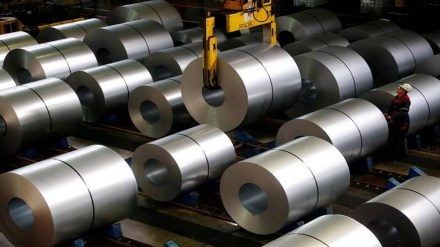By Nagendra Nath Sinha
The steel industry relies heavily on coal and coke as primary fuels. It also contributes to a significant 8 % of total carbon emissions. Lack of mature low carbon emission technologies, huge investment for transition, relatively young age of the steelmaking facilities and rising demand for steel in the aspirational economies like India make it hard to reduce the emissions significantly and swiftly.
The steel sector decarbonisation has multiple drivers: efficient energy use, alternate fuels like natural gas, increased scrap usage and renewable energy. Newer technologies of hydrogen steelmaking, carbon capture, storage and utilisation appear to be viable in the medium term. Disruptive technologies such as molten metal electrolysis may mature in the long term. In this sombre scenario, biofuels, mainly biochar, emerge as a viable option in the short to medium term. This alternative to conventional fossil fuels, born from pyrolysis or other processes on biomass is both green and sustainable.
Biomass can be used across various production stages, from coke-making, sintering to iron making in the blast furnaces. Literature offers tantalising possibilities of replacing about 20 % of overall fossil fuel-based carbon through biochar-based sources in steel production.
However, as with any transformative endeavour, biochar integration into steel production is not without its challenges. It necessitates rigorous research and development to ascertain the feasibility of biochar usage, developing sustainable biomass sources, business models linking farm to factory and so on. Addressing them would determine the extent of its use in the steel production.
India generates approximately 750 million metric tonnes of biomass annually. It provides for about 32% of the country’s primary energy. However, not all forms of biochar can serve steel industry, due to stringent requirement of iron and steel making processes. In this backdrop, bamboo appears as an ideal source of biomass for production of biochar, as the country boasts a high acreage of about 14 million hectares and rich diversity of 136 species. Bamboo’s cost-effectiveness, rapid growth, impressive biomass yield, and properties similar to coal make it an ideal candidate for sustainable biochar production.
Unlocking the full potential of biofuel in steel production necessitates strategic planning. It demands an expansion of bamboo and other biomass cultivation and the resolution of logistical bottlenecks, including fire safety during transit. The path forward appears to be grounded in decentralisation, facilitating semi-processing at the farmer level and creating rural employment opportunities, and enhancing economic well-being. Much of it can be tied up with programmes such as National Bamboo Mission and plantations under MGNREGA.
Moreover, the steel sector must brace itself for an inevitability—a statutory mandate mirroring that imposed on power plants for the utilisation of biomass pellets. Collaborative efforts, encompassing steel researchers, equipment manufacturers, and startups, will be instrumental in augmenting the 20% charge-mix of biofuel in steel production.
Despite high availability of biomass, usage of biofuels remains low. As of August 2022, less than 3% of India’s installed electricity generation capacity comes from biomass power, cogeneration, and waste-to-energy projects. To capitalise on these opportunities, policies, investments, and collaborations in the biomass energy sector are imperative.
India is strongly committed to advancing sustainable biofuel solutions. It has mandated biomass co-firing in thermal power plants and initiated SATAT to promote compressed biogas (CBG) in transportation. Union Budget for 2023 announced establishing 500 ‘waste to wealth’ plants under the GOBARdhan scheme and mandated 5% CBG blending for organisations marketing natural and biogas. These efforts have already yielded significant results, including the implementation of over 800 biomass power projects and bagasse and non-bagasse cogeneration ventures with 10,632 MW of power generation capacity and production of 140 TPD of CBG.
To help other countries reap similar benefits from adoption of biofuels, as the current G20 Chair, India introduced the Global Biofuel Alliance (GBA). The GBA seeks to achieve this by promoting technology advancements, sustainable biofuel usage, robust standards, and certifications, and serving as a knowledge hub for diverse stakeholders and facilitating global collaboration.
As India charts its course towards a sustainable energy future, several key strategies must be pursued in this regard:
1. Biomass (waste) management: This will entail establishing a reliable supply chain for biomass, encompassing collection, transportation, and processing, is imperative.
2. Biomass trading platforms: This will need the development of formal trading platforms for both raw and processed biomass, thus creating transparent pricing mechanisms.
3. Industry-academia collaboration: Collaborations between industry and academia, including foreign research institutes, are critical for advancing research and development in this regard.
4. Financial support: Expanding programs like the Partial Risk Sharing Facility for Energy Efficiency (PRSF) can improve access to finance for biofuel projects.
5. Capacity-building: Building the capacity of steelmakers, banks, and other stakeholders to conceptualise, evaluate, finance, implement biofuel projects, and manage offtake arrangements is imperative for the biofuel transition.
6. Programmatic convergence: Programmes such as National Bamboo Mission and MGNREGA as well as institutions like banks could partner for production of fast-growing biomass like bamboo on marginal lands through partnership. Growers could be organised in FPOs, which could set up processing centres for supplying biochar in ready to use form.
With concerted efforts, strategic planning, and unwavering commitment, India could realise biofuel’s promise in decarbonising the steel sector.
Nagendra Nath Sinha, Secretary, ministry of steel, Government of India. Views are personal.
